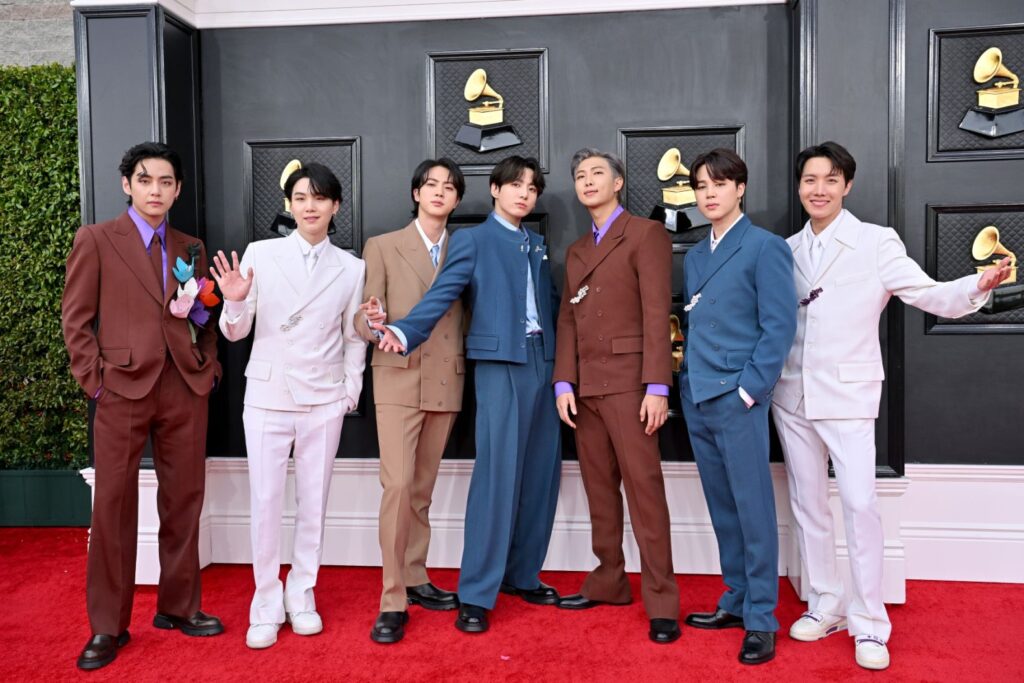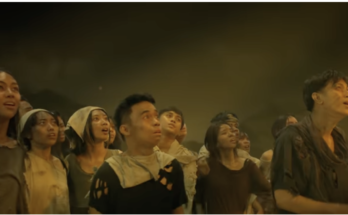“BEYOND the Story: 10-Year Record of BTS” was released July 9 (ARMY Day for BTS fans), immediately soaring to the top of Amazon’s bestseller charts in a number of hours.
The Korean idol group, made up of members Suga, Jungkook, V, Jimin, RM, Jin and J-Hope, didn’t just top Amazon’s general bestsellers list. “Beyond the Story” also topped the company’s Best Sellers in Memoirs and Best Sellers in Rock Band Biographies lists.
The 544-page book, which comes as BTS celebrates 10 years, took three years of research and more than two years of interviews to write. Its seven chapters (“Seoul”, “Why We Exist”, “Love, Hate, Army”, “Inside Out”, “A Flight That Never Lands”, “The World of BTS” and “We Are”) detail the band’s entire career chronologically, leaving no moment unexcavated.
Published in 23 languages, “Beyond the Story” is an exhaustive archive of the boy band and a definitive document for die-hard ARMY (which stands for Adorable Representative Master of Ceremonies for Youth).

The time traces the major eras of the group’s rise. Many readers will know where the story eventually goes – several No. 1 Billboard Hot 100 hits, Grammy nominations, performances at the Grammys and American Music Awards, over one billion views of their music videos on YouTube, multiple United Nations General Assembly appearances, a White House visit and countless historic firsts.
The band released “My Universe” with Coldplay, whose frontman, Chris Martin, seemed to speak for billions when he said, “It’s very special to me that the most popular artist in the world speaks Korean…and it just feels very hopeful to me, in terms of thinking of the world as one family.”
Solo projects
BTS said last year that the group is taking a break – but the powerhouse K-pop group is making it clear that they’re not breaking up.
“We’re going into a hiatus now,” Suga said in a more than hour-long video on YouTube and translated from Korean with English subtitles.
A statement from Hybe, the South Korean entertainment company behind BTS, said they’ll still be working on projects as a group, as well as individually. “BTS are not taking a hiatus. Members will be focusing more on solo projects at this time.”
Meanwhile, BTS members remain busy:
● Suga has been on tour.
● J-Hope performed at Lollapalooza, where he was the first South Korean act to headline and has a documentary dubbed “J-Hope in the Box”, exploring his first solo album.
● Jimin has released his debut solo album.
● Jungkook performed at the World Cup, debuting his new song “Dreamers”.
● V was involved in an upcoming reality television program, tvN’s “Seojin’s”.
● RM has set records with his solo album “Indigo”. He is the first Korean soloist to enter the Top 3 of the Billboard 200 album chart and the first Korean male soloist to have an album at least five weeks on the Billboard 200.
Not a typical biography
Written by Myeongseok Kang and translated into English by Anton Hur, Slin Jung and Clare Richards, the book is less a traditional biography than a meticulous accounting of how BTS was born in a K-pop dormitory and became a worldwide juggernaut under the once-tiny record label Big Hit (now the massive entertainment company Hybe).
Many ARMYs first learn about BTS’ long, bumpy history through fan-made YouTube videos, official documentaries, livestreams, memes and Twitter threads. Now this history is available in a comprehensive package, narrated by Kang. The author covers every album, tour and awards show until mid-2022, right before BTS announced that they would temporarily be focusing on solo projects and preparing for their mandatory military service. The book doesn’t delve into their lives outside their job, which is unsurprising, given that the members are extremely protective of their personal relationships and known for working nonstop. But Kang still manages to layer an emotional history on top of the professional one. By contemplating their evolution as artists, BTS members also give readers a clear sense of how they grow as human beings in the crucible of fame.

The band talks about their hopes, thoughts, feelings and experiences – the unrivaled access that sets this official biography apart from the countless unofficial others. Many of these stories will be familiar to ARMY, but the group’s personal recollections provide a feeling of freshness.
More often than not, BTS’ quotes are loaded with emotionality, though there’s a bit of humor as well. Fans will surely react when reading Jin describing Suga’s 2013 dietary habits, which included blending chicken breasts, grape juice and bananas for quick protein.
Personality clashes
Kang conveys the intensity and savvy of BTS’ leader, Kim Namjoon (stage name RM), who was recruited as a teenager by the mastermind producer Bang Si-hyuk to form a hip-hop group with the fellow underground rapper and aspiring composer Min Yoongi (Suga) and the highly respected street dancer Jung Hoseok (J-Hope). Eventually, Bang, wanting BTS to be more of a traditional idol group, brought in four vocalists: the unflappable eldest, Kim Seokjin (Jin); the perfectionist Park Jimin (Jimin); the versatile Kim Taehyung (V); and the golden maknae (or multitalented youngest), Jeon Jungkook (Jungkook).
When they first met, they experienced the typical personality clashes of any new group: The clean freaks balk at the dirty dishes in the sink, cereal and sweaty clothes scattered on the floor. The hip-hop aficionados hold constant lessons to teach the novices about rap music. Everyone, regardless of dance experience, practices the tough choreography until they’re perfectly in sync – all while they’re on strict diets. (Kang devotes several pages to Jimin and V’s fight over dumplings.) “The more you look back on BTS’s preparation for their debut, the more surprising it is that none of them quit in the process,” Kang writes. Even after that 2013 entrance, the members described experiencing isolation and facing mockery from many of their peers at bigger, more financially successful companies.
DIY endeavor to promote BTS
Kang provides context about the broader K-pop world, showing just how many rules BTS broke to differentiate itself from its peers and predecessors. The members filmed vlogs offering fans an unpolished look at their lives, even sometimes criticizing Bang or the company directly – a “complete rejection of genre norms in Korea’s idol industry,” the author writes. And yet it was exactly this sense of spontaneity and intimacy that fueled BTS’ fanatical fan base.
Even when they were confused by their popularity, BTS expressed deep gratitude to the people who boosted them. Jimin tells Kang, “Even now, I remember that one row next to the broadcast cameras during our first performance,” referring to the handful of fans who showed up to cheer them on as rookies. For ARMYs, such genuine humility is part of what makes them so appealing – they’ve never behaved as though success was an inevitable outcome of their talent or hard work. Of “Dynamite” topping the Billboard Hot 100, Suga talks about not wanting to bask in the achievement: “I realized it would be wiser to get back down to Earth as quickly as possible. There was no need to be floating in the air like that.”
When the group won Artist of the Year in the 2021 American Music Awards, Suga couldn’t help thinking someone had made a mistake – or the world was playing a prank on him. “I felt like we’d been outsiders or outliers until then,” RM said. “But now it felt, not like we were in the mainstream necessarily, but we were being welcomed more.” Jungkook said winning the award felt like the beginning of a new chapter: “Who would’ve thought we could win Artist of the Year at an American awards ceremony? It was so shocking. It sent chills down my spine.”
Reckoning with misogyny
It wasn’t all praise, though. The band came under fire for the songs “War of Hormones” (2014) and “Joke” (2015) that fans said perpetuated gender inequality and misogyny.
In 2016, Hybe and BTS issued a statement responding to the complaints, saying, “We learned that music creation is not free from societal prejudice and fallacies.” And “Furthermore, we became aware that it may also not be desirable to define the value of women and their role in society from a male perspective.”
RM, who wrote the lyrics, told Kang that this early reckoning helped him recognize the problem in time to change his attitude and behavior.
According to Kang, gender sensitivity training is now obligatory for all artists at Hybe before they can debut.
Bewildering growth process
“Beyond the Story” immerses the reader in how disconcerting this whole growth process was from BTS’ perspective. Extreme highs (appearing on the American Music Awards and Billboard Music Awards, as well as major talk shows) are juxtaposed with profound lows (overwork, unrelenting depression, an increasing lack of privacy). The members open up about the stress of becoming huge in the US, a totally unfamiliar market, when six of the seven didn’t speak English. J-Hope recalls berating himself for not being able to master the language as quickly as intricate dance moves: “Each time, in the hotel room I thought to myself, ‘Oh, so I guess this is all I amount to.'” Once they began to adjust to the international nature of their fame, the pandemic arrived. They were forced to abandon their plans and experiment once again by releasing their first English-language single, “Dynamite”, whose success surprised RM: “The fandom must’ve craved it more than we’d thought,” he said.
Not until this later part of BTS’ career, Kang writes, did the members transition from doing things for “the sake of outside approval or to prove themselves” to turning inward and “trying to reach a point of excellence where they could feel satisfied with their results.” Jungkook, who joined Hybe in middle school, talks about learning how to recognize his own emotions for the first time and “unleash” them in music. V reflects on growing older and going through an “adolescence of the mind,” before realizing that he’s the kind of musician who can write only when genuinely inspired. Jin talks about abandoning his obsessive worrying to the point of “living without any thought at all,” which allowed more “mental space” to sustain his work.
Clearly, “Beyond the Story” is a book for BTS fans, a love letter to the community that made their career and a reminder that there is always more to learn about them. Kang doesn’t touch on what lies ahead. The group’s future chapters have yet to be written, but this oeuvre tells a complete story. It’s a document capturing how it feels to go from aspiring musician to global superstar and what it takes to do so.





